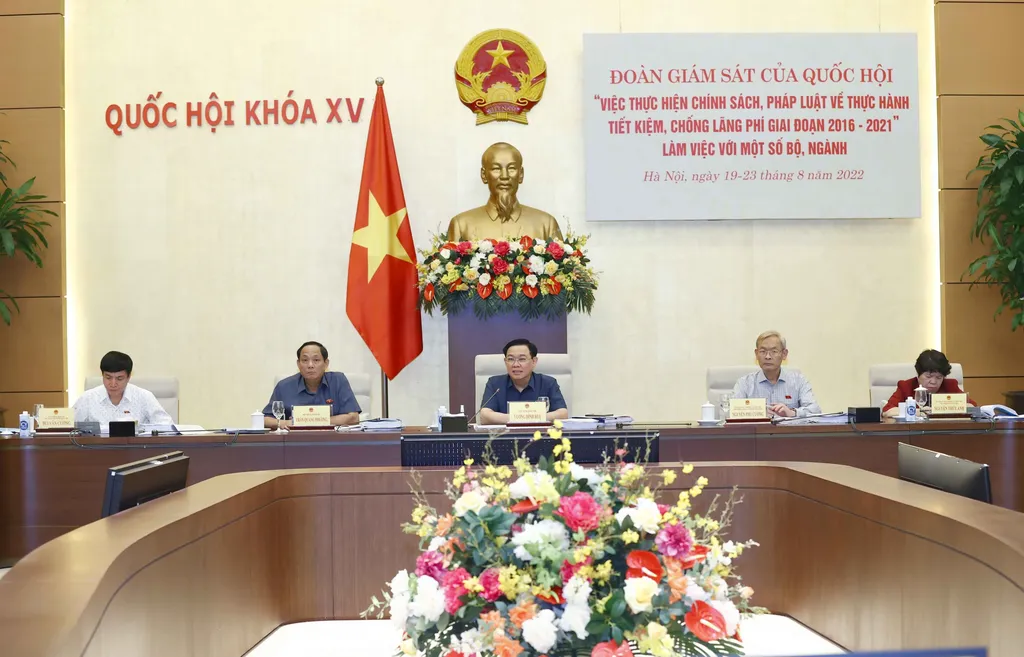 Politics & Law
Politics & Law

{ "id": "uf5s_56BVN", "type": "myToolImages", "data": { "data": "" } }
 |
| The National Assembly's supervisory delegation on the implementation of policies and laws on thrift and anti-wastefulness in the 2016- 2021 period worked with the Ministry of Finance on Tuesday. — VNA/VNS Photo |
{ "id": "5lHnfeCNS3", "type": "myToolImages", "data": { "data": "" } }
HÀ NỘI — A total of 74,443 State employees were laid off between 2015 and 2021 following the policy of the Party and Government to downsize the number of public employees.
The number was reported by Minister of Finance Hồ Đức Phớc at a working session between the ministry and the National Assembly's supervisory delegation on the implementation of policies and laws on thrift and anti-wastefulness in the 2016-2021 period.
Downsizing the State budget payroll is among measures that the Government of Việt Nam employs to achieve more effective State budget spending.
The total number of civil servants who are paid by the state budget in 2022 is 256,685, an increase of 7,035 compared to 2021.
The number of civil servants working at state administrative agencies and organisations is 247,722, compared to 247,344 in 2021, an increase of 378. Of the figure, administrative agencies and organisations under ministries, ministerial-level agencies, government agencies and organisations established by the Government and the Prime Minister (not public units) have 106,890 public servants.
Administrative agencies and organisations of the People's Council and People's Committees of provinces and districts have 140,832 public servants.
Around 1,068 public servants are working at Việt Nam's representative missions abroad.
According to the ministry's report, from 2016 to 2021, units under the ministry saved VNĐ6.087 trillion (nearly US$260 million) in the preparation, appraisal and approval of estimates, settlement and use of state budget funds. They cut expenses for the organisation of ground-breaking ceremonies and inauguration events.
They cut down and stopped spending on unnecessary or inefficient work.
The ministry reduced its payroll by dismissing 1,166 staff and kept only 26 public service units instead of 36.
From 2016 to 2021, State budget expenditure fell by about VNĐ22.3 trillion including about VNĐ12.8 trillion from the central budget and VNĐ9.5 trillion from local budgets.
In 2021, the State budget expenditure continued to be reduced by about VNĐ3.26 trillion in association with the downsizing of the payroll and reorganisation of the apparatus. Accordingly, the central budget expenditure was reduced by VNĐ 875 billion and the local budget expenditure by about VNĐ2.385 trillion.
In the last two years, the Ministry of Finance requested localities save an additional 10 per cent on regular expenses and 70 per cent on work trips and conference fees.
As a result, in the last six months of 2020, localities cut 70 per cent of work trip allowances worth VNĐ1.046 trillion, saving an additional 10 per cent of regular expenses worth VNĐ6.441 trillion.
Last year, the ministry cut half of the cost of conferences and domestic and foreign missions to VNĐ896.6 billion, saving an additional 10 per cent in recurrent expenses or VNĐ5.046 trillion.
Minister Phớc said that on a national scale, in the 2016-2021 period, the total saving on the state budget and capital was VNĐ350 trillion.
Six administrative units at the district level and 546 administrative units at the commune level were removed.
From 2015 to 2020, 74,443 staff were made redundant, he said.
Through inspection and examination of thrift and anti-waste work, it was proposed to recover VNĐ181 trillion for the State budget and 7,675 ha of land.
National Assembly Chairman Vương Đình Huệ said that the Ministry of Finance on behalf of the State was not simply "scissors" to cut spending.
"The practice of thrift and anti-waste must be in accordance with the spirit of the Law on thrift practice and anti-waste. Performing the same assigned work at a lower cost; using the same resources but creating higher added value," he said.
"VNĐ1 billion can be spent on a necessary work immediately, but if it is not necessary, no single penny should be spent," Huệ said.
Another aspect of thrift and anti-wastefulness was to remove bottlenecks and obstacles in managing human resources, material resources and financial ability, Huệ said.
"The Ministry of Finance needs to review documents that are causing bottlenecks in public services, public non-business services, regular expenditures, public property, public vehicles, wage reform, the issuance of bonds, tax reform and anti-transfer pricing in FDI enterprises," Huệ said.
The Ministry of Finance should also advise the Government to handle problems in projects using State capital because those projects, once delayed, would also create waste, he said. — VNS




